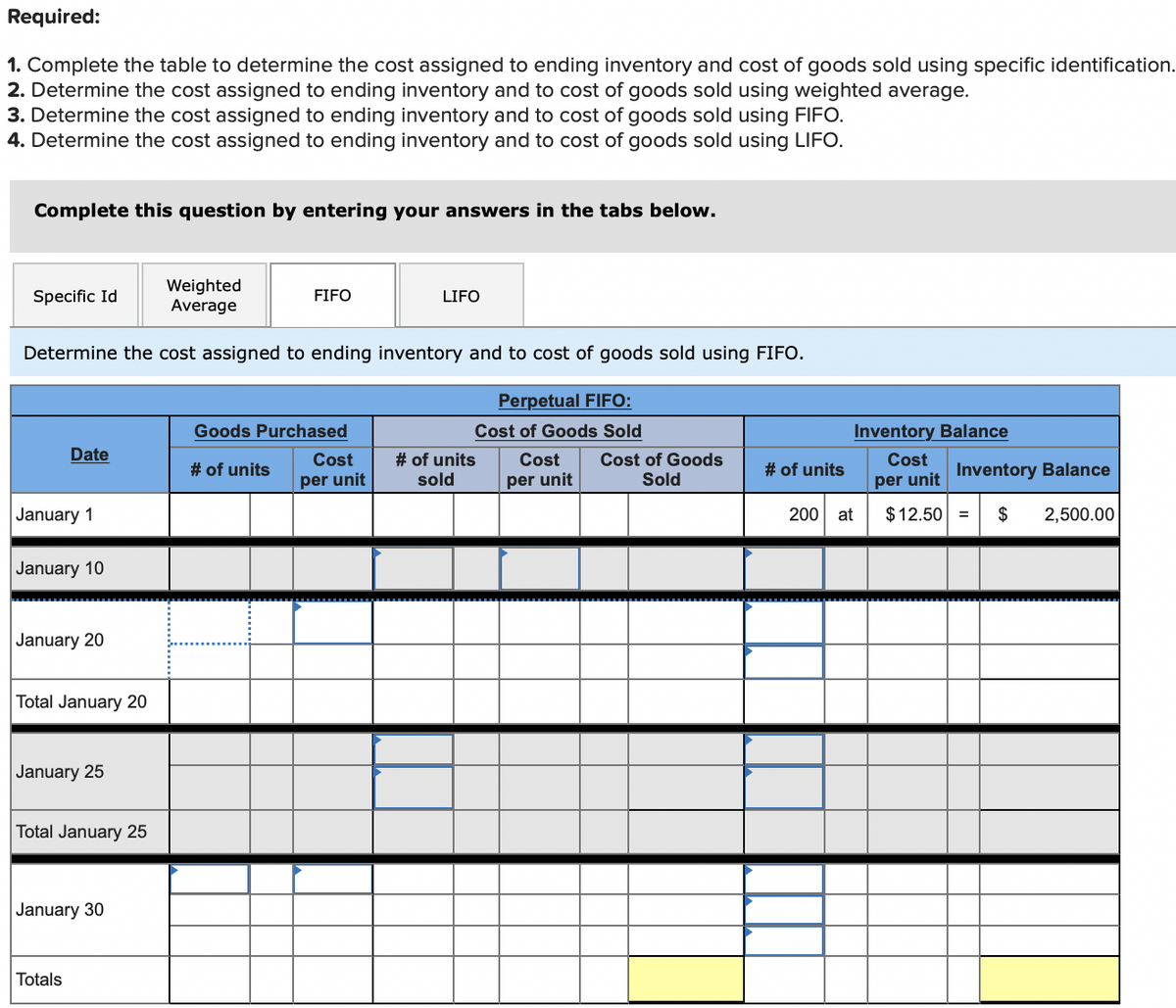Determine the cost assigned to ending inventory and to cost of goods sold using FIFO. Perpetual FIFO: Goods Purchased Cost of Goods Sold Inventory Balance Date # of units sold Cost Cost of Goods Sold Cost Cost # of units # of units Inventory Balance per unit per unit per unit January 1 200 at $12.50 = $ 2,500.00 January 10 January 20 Total January 20 January 25 Total January 25 January 30 Totals
Determine the cost assigned to ending inventory and to cost of goods sold using FIFO. Perpetual FIFO: Goods Purchased Cost of Goods Sold Inventory Balance Date # of units sold Cost Cost of Goods Sold Cost Cost # of units # of units Inventory Balance per unit per unit per unit January 1 200 at $12.50 = $ 2,500.00 January 10 January 20 Total January 20 January 25 Total January 25 January 30 Totals
Century 21 Accounting Multicolumn Journal
11th Edition
ISBN:9781337679503
Author:Gilbertson
Publisher:Gilbertson
Chapter20: Accounting For Inventory
Section20.2: Determining The Cost Of Merchandise Inventory
Problem 1OYO
Related questions
Question
100%
Need some help with FIFO, thank you ahead of time.

Transcribed Image Text:Required:
1. Complete the table to determine the cost assigned to ending inventory and cost of goods sold using specific identification.
2. Determine the cost assigned to ending inventory and to cost of goods sold using weighted average.
3. Determine the cost assigned to ending inventory and to cost of goods sold using FIFO.
4. Determine the cost assigned to ending inventory and to cost of goods sold using LIFO.
Complete this question by entering your answers in the tabs below.
Weighted
Average
Specific Id
FIFO
LIFO
Determine the cost assigned to ending inventory and to cost of goods sold using FIFO.
Perpetual FIFO:
Goods Purchased
Cost of Goods Sold
Inventory Balance
Date
Cost of Goods
Sold
Cost
# of units
sold
Cost
Cost
# of units
# of units
Inventory Balance
per unit
per unit
per unit
January 1
200 at
$ 12.50 =
2,500.00
January 10
January 20
Total January 20
January 25
Total January 25
January 30
Totals
24
![Required information
Use the following information for the Exercises 3-7 below. (Algo)
[The following information applies to the questions displayed below.]
Laker Company reported the following January purchases and sales data for its only product. The Company uses a
perpetual inventory system. For specific identification, ending inventory consists of 300 units from the January 30
purchase, 5 units from the January 20 purchase, and 25 units from beginning inventory.
Activities
Units Acquired at Cost
200 units @ $ 12.50 =
Date
Units sold at Retail
$ 2,500
January 1
January 10
January 20
January 25
January 30
Beginning inventory
Sales
Purchase
Sales
Purchase
160 units
$ 21.50
130 units @ $ 11.50 =
1,495
140 units
@
$ 21.50
300 units @ $ 11.00 =
3,300
$ 7,295
Totals
630 units
300 units](/v2/_next/image?url=https%3A%2F%2Fcontent.bartleby.com%2Fqna-images%2Fquestion%2Fcbaaf3a5-97a4-44d4-82b4-c685cbb2fa1a%2F071ba7e9-8f1a-41d2-b63a-35df626d9acb%2Fkafx9o1_processed.png&w=3840&q=75)
Transcribed Image Text:Required information
Use the following information for the Exercises 3-7 below. (Algo)
[The following information applies to the questions displayed below.]
Laker Company reported the following January purchases and sales data for its only product. The Company uses a
perpetual inventory system. For specific identification, ending inventory consists of 300 units from the January 30
purchase, 5 units from the January 20 purchase, and 25 units from beginning inventory.
Activities
Units Acquired at Cost
200 units @ $ 12.50 =
Date
Units sold at Retail
$ 2,500
January 1
January 10
January 20
January 25
January 30
Beginning inventory
Sales
Purchase
Sales
Purchase
160 units
$ 21.50
130 units @ $ 11.50 =
1,495
140 units
@
$ 21.50
300 units @ $ 11.00 =
3,300
$ 7,295
Totals
630 units
300 units
Expert Solution
This question has been solved!
Explore an expertly crafted, step-by-step solution for a thorough understanding of key concepts.
This is a popular solution!
Trending now
This is a popular solution!
Step by step
Solved in 2 steps with 2 images

Knowledge Booster
Learn more about
Need a deep-dive on the concept behind this application? Look no further. Learn more about this topic, accounting and related others by exploring similar questions and additional content below.Recommended textbooks for you

Century 21 Accounting Multicolumn Journal
Accounting
ISBN:
9781337679503
Author:
Gilbertson
Publisher:
Cengage


Excel Applications for Accounting Principles
Accounting
ISBN:
9781111581565
Author:
Gaylord N. Smith
Publisher:
Cengage Learning

Century 21 Accounting Multicolumn Journal
Accounting
ISBN:
9781337679503
Author:
Gilbertson
Publisher:
Cengage


Excel Applications for Accounting Principles
Accounting
ISBN:
9781111581565
Author:
Gaylord N. Smith
Publisher:
Cengage Learning

Financial And Managerial Accounting
Accounting
ISBN:
9781337902663
Author:
WARREN, Carl S.
Publisher:
Cengage Learning,

Cornerstones of Financial Accounting
Accounting
ISBN:
9781337690881
Author:
Jay Rich, Jeff Jones
Publisher:
Cengage Learning

Principles of Accounting Volume 1
Accounting
ISBN:
9781947172685
Author:
OpenStax
Publisher:
OpenStax College